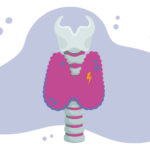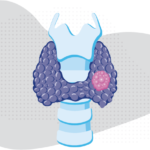Congenital hypothyroidism: New guidance for clinicians

Congenital hypothyroidism is usually caused by a baby being born with an absent or underactive thyroid gland. When not treated, it’s one of the most common preventable causes of intellectual disability. Although newborn screening can identify congenital hypothyroidism and lead to prompt treatment, an estimated 70 percent of newborns worldwide are born in regions that don’t perform universal screening. Now, updated guidelines from the American Academy of Pediatrics — including co-authors Ari Wassner, MD and Jessica Smith, MD, of Boston Children’s Thyroid Center — offer clinicians expert insight into identifying and managing congenital hypothyroidism.
When, who, and how to screen
Newborn screening is important to prevent complications of congenital hypothyroidism because it can lead to an early diagnosis, effective treatment, and ongoing follow-up. Because screening earlier than the first 24 hours of life has an increased risk of false-positive results, Wassner, Smith, and their colleagues recommend that infants should be screened between 24 and 72 hours after birth. Most newborn screening is overseen by the state or region where the baby is born and can use any of three strategies for testing a dried blood spot obtained by heel stick:
- primary thyroid-stimulating hormone (TSH) and reflex thyroxine (T4) measurement
- primary T4 and reflex TSH measurement
- combined T4 and TSH measurement
Infants whose first test is normal but who meet certain high-risk criteria warrant a second screening when they are 2 to 4 weeks old. This includes those who were born prematurely, have a very low birth weight, or were ill enough to be admitted to the NICU.
For premature infants, if the second screening is normal, the guidelines’ authors recommend repeat testing four weeks later. For all screenings, any abnormal results should be sent to the infant’s pediatrician, who should then confirm them within 24 hours through a serum sample.
How pediatric endocrinologists can help
Pediatric endocrinologists play an integral role in the diagnosis and management of congenital hypothyroidism. Pediatricians should consider consulting with a pediatric endocrinologist to:
- confirm a diagnosis of congenital hypothyroidism
- determine whether and how to treat with medication (typically with 10 to 15 mcg per kilogram a day of enteral levothyroxine)
- determine whether thyroid imaging is recommended
- determine whether genetic testing may be helpful
- establish follow-up monitoring and care.
“Congenital hypothyroidism is simple to treat, but it has to be diagnosed and treated early to avoid potentially serious, lifelong consequences,” says Wassner. “These guidelines are designed to help health care systems and primary care providers reliably identify affected babies soon after birth, so they can receive the treatment they need and have the best possible outcome.”
Questions? Contact the Thyroid Center or refer a patient.
Related Posts :
-

Does thyroid cancer in children behave differently than in adults?
Once relatively uncommon, pediatric thyroid cancer is increasing among children and is now the most common type of cancer diagnosed ...
-

Thyroid nodules in children: When to refer
You’re doing a regular well-child check when you think you feel a lump in the front of the neck. ...
-

Study: Tool for thyroid nodule evaluation misses thyroid cancers in children
A thyroid nodule is a solid or fluid-filled lump that forms within the thyroid gland. Most thyroid nodules that develop ...
-

Charting a new path for pediatric thyroid cancer treatment
Thyroid cancer is the most common type of endocrine cancer in children. Because it is bilateral — affecting both sides (...





